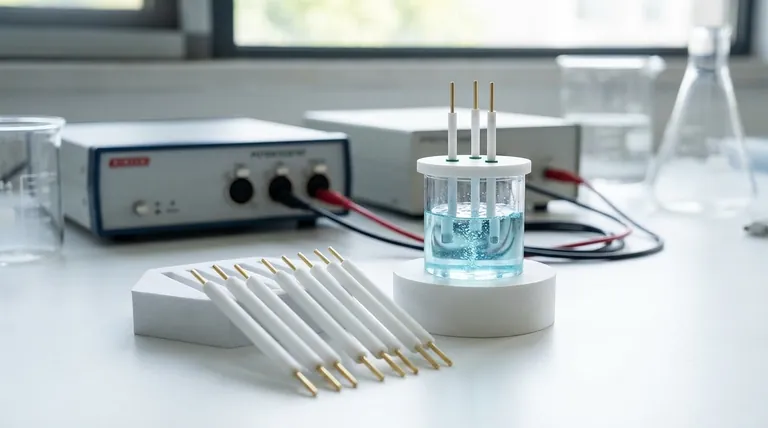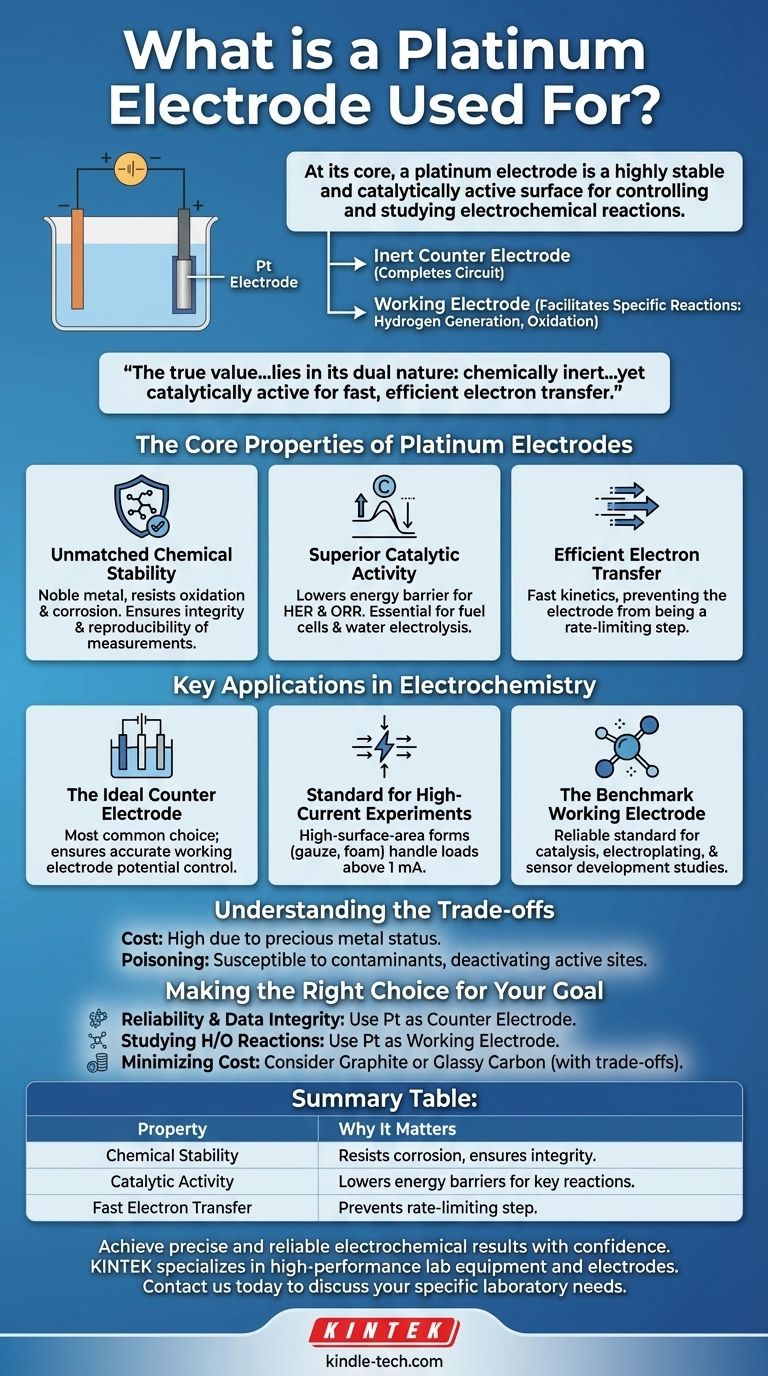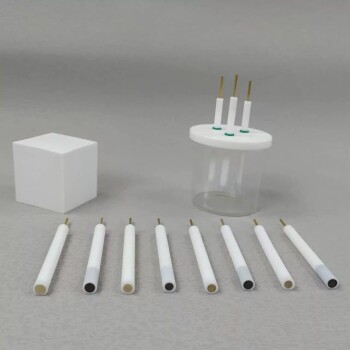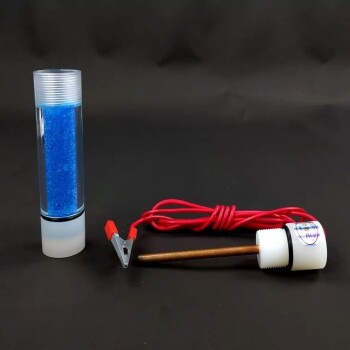At its core, a platinum electrode is used as a highly stable and catalytically active surface for controlling and studying electrochemical reactions. Its primary roles are to act as an inert counter electrode to complete a circuit or as a working electrode to facilitate specific reactions like generating hydrogen or oxidizing organic compounds.
The true value of a platinum electrode lies in its dual nature: it is chemically inert enough not to interfere with the experiment, yet catalytically active enough to ensure that electron transfer is fast and efficient, providing clean and reliable data.

The Core Properties of Platinum Electrodes
Unmatched Chemical Stability
Platinum is a noble metal, meaning it strongly resists oxidation and corrosion in most chemical environments.
Unlike more reactive metals, a platinum electrode will not dissolve or form an insulating oxide layer during an experiment. This ensures the integrity and reproducibility of your measurements.
Superior Catalytic Activity
Platinum is not just a passive conductor; it actively lowers the energy barrier for many important reactions.
It is the benchmark catalyst for reactions like the hydrogen evolution reaction (HER) and the oxygen reduction reaction (ORR), making it essential in fields like fuel cell research and water electrolysis.
Efficient Electron Transfer
A key requirement for an electrode is the ability to move electrons to and from chemical species in a solution without significant delay.
Platinum excels at this, offering fast electron transfer kinetics. This prevents the electrode itself from becoming the rate-limiting step in an electrochemical process.
Key Applications in Electrochemistry
The Ideal Counter Electrode
In a typical three-electrode setup, the counter electrode (or auxiliary electrode) serves to complete the electrical circuit.
Platinum is the most common choice for this role because its efficiency ensures the potential of the working electrode is controlled accurately, without the counter electrode limiting the flow of current.
The Standard for High-Current Experiments
For experiments that demand a high current (typically above 1 mA), the electrode's surface area becomes critical.
To handle this load, platinum is often used in high-surface-area forms like platinum gauze or platinum foam, which provide ample sites for charge transfer to occur.
The Benchmark Working Electrode
When the reaction of interest is being studied directly, platinum is often used as the working electrode.
This is especially true for fundamental studies of catalysis, electroplating, and sensor development, where its well-defined and highly active surface provides a reliable standard.
Understanding the Trade-offs
The Issue of Cost
The most significant drawback of platinum is its high cost. As a precious metal, its price can make it prohibitive for large-scale applications or budget-constrained labs.
Susceptibility to Poisoning
While highly stable, a platinum electrode's catalytic surface can be "poisoned" by contaminants like sulfides, carbon monoxide, or certain organic molecules.
This poisoning deactivates the electrode by blocking the active sites, which can reduce its efficiency over time and may require cleaning or polishing procedures.
Making the Right Choice for Your Goal
Selecting the right material is crucial for the success of any electrochemical experiment.
- If your primary focus is reliability and data integrity: Use platinum as your counter electrode to ensure it never limits your experiment's performance.
- If your primary focus is studying hydrogen or oxygen reactions: Use a platinum working electrode as it is the globally recognized benchmark for these catalytic processes.
- If your primary focus is minimizing cost for a general application: Consider alternatives like graphite or glassy carbon, but be aware of their potential for slower kinetics and lower stability.
Ultimately, selecting a platinum electrode is an investment in certainty, ensuring your results reflect the chemistry of your system, not the limitations of your equipment.
Summary Table:
| Property | Why It Matters for a Platinum Electrode |
|---|---|
| Chemical Stability | Resists corrosion and oxidation, ensuring experiment integrity and reproducible data. |
| Catalytic Activity | Lowers energy barriers for key reactions (e.g., hydrogen evolution, oxygen reduction). |
| Fast Electron Transfer | Prevents the electrode from being the rate-limiting step in electrochemical processes. |
Achieve precise and reliable electrochemical results with confidence.
The right lab equipment is fundamental to your research success. KINTEK specializes in high-performance lab equipment and consumables, including reliable electrodes designed for accuracy and durability.
Contact us today to discuss how our solutions can meet your specific laboratory needs and enhance your experimental outcomes.
#ContactForm
Visual Guide

Related Products
- Rotating Platinum Disk Electrode for Electrochemical Applications
- Platinum Sheet Electrode for Laboratory and Industrial Applications
- Gold Disc Electrode
- Platinum Auxiliary Electrode for Laboratory Use
- Gold Electrochemical Sheet Electrode Gold Electrode
People Also Ask
- How should a platinum wire/rod electrode be cleaned before use? A Guide to Reliable Electrochemical Data
- What is a common application for the platinum wire/rod electrode? The Essential Guide to Counter Electrodes
- What is the rotating ring disk electrode method? Unlock Real-Time Reaction Analysis
- What is the common role of a platinum disk electrode? A Guide to Its Primary Use as a Working Electrode
- What is the difference between ring disk electrode and rotating disk electrode? Unlock Deeper Electrochemical Insights



















